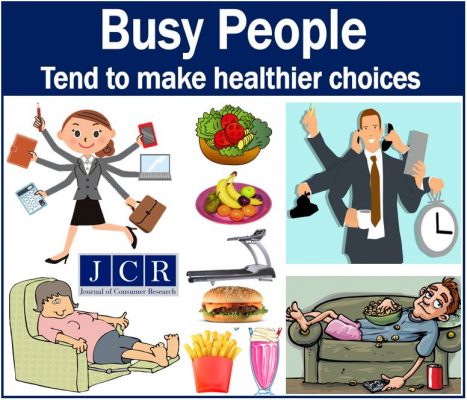People who perceive themselves as busy are more likely to make healthier choices, a new study has shown. Although we complain about being too busy in today’s fast-moving world, it has some advantages. Individuals who perceive themselves as busy are more likely to delay gratification. They subsequently make decisions that benefit them in the long-term. This is what researchers from the global business school INSEAD, Temple University, and HKUST have found.
Regarding the choices we make every day, Amitava Chattopadhyay said:
“Every day, we make many decisions that involve choosing between our immediate and future well-being. For instance, do we go to the gym after work, or do we just go home to relax in front of the television?”
“Do we save money for retirement, or do we splurge on a trip? Do we eat fruit or cake for dessert? When we perceive ourselves to be busy, it boosts our self-esteem, tipping the balance in favor of the more virtuous choice.”
Amitava Chattopadhyay is a Professor of Marketing and The GlaxoSmithKline Chaired Professor in Corporate Innovation at INSEAD. He is also Associate Editor at the Journal of Consumer Psychology.
Prof. Chattopadhyay and colleagues wrote about their study and findings in the Journal of Consumer Research (citation below).
His co-authors included Jeehye Christine Kim and Monica Wadhwa. Kim is an Assistant Professor of Marketing at Hong Kong University of Science and Technology (HKUST). Wadhwa is an Associate Professor of Marketing and Supply Chain Management, Fox School of Business at Temple University.
Busyness vs. business
Busyness and business have completely different meanings.
A ‘business‘ is a firm or a company. It is an entity that engages in commerce. It also refers to the act of buying and selling products and services.
‘Busyness‘ is the noun of ‘busy.’ It is the state or condition of having much to do. In other words, the state or condition of being busy.
We pronounce ‘business’ (bɪz-nəs) with two syllables, and ‘busyness’ (bɪ-zɪ-nəs) with three syllables.

Busy people – a ‘badge of honor’
Their study showed that individuals who consider themselves as ‘busy people’ perceive it as a ‘badge of honor.’ They can leverage that badge of honor to promote better self-control.
The authors explain that there may be a flip side to being busy.
People who feel under considerable time pressure tend to become anxious. They also make hedonistic decisions.
However, individuals who simply see themselves as busy people tend to make virtuous choices. They make virtuous choices as a result of their perceived self-importance.
Busy people – self-esteem
The researchers activated the busy mindset of volunteers through various means across a series of studies.
They would sometimes expose them to messaging that subtly suggested that they were busy people.
In other experiments, the researchers asked the participants to write what had recently been keeping them busy.
The authors subsequently asked the participants to make decisions in different self-control domains. The decisions were related to, for example, retirement savings, exercise, or food.
Busy people made virtuous decisions
Those who had been reminded that they were ‘busy people’ made virtuous decisions. Specifically, decisions that were more virtuous than the control participants.
In this context, the control participants were those who had not been reminded of their busy lifestyle.
Importantly, the authors’ studies proved that a heightened sense of self-importance was the major reason behind their greater self-control.
Prof. Chattopadhyay said:
“When we temporarily dampened the sense of self-importance of participants who otherwise felt busy, the self-control effect vanished.”
Marketing – targeting busy people
Marketers, i.e., marketing professionals, commonly use busyness as a campaign concept because consumers can relate to it. However, should we use busyness when the advertised product is an indulgent one?
In other words, when promoting fast food, mightn’t the campaign backfire?
Prof. Chattopadhyay said:
“Busyness appeals should be more effective for products that require people to assert self-control, as would be the case for a gym chain, for example.”
Citation
“When Busy is Less Indulging: Impact of Busy Mindset on Self-Control Behaviors,” Jeehye Christine Kim, Monica Wadhwa, and Amitava Chattopadhyay. Journal of Consumer Research, ucy069, https://doi.org/10.1093/jcr/ucy069. Published: 15 September 2018.

